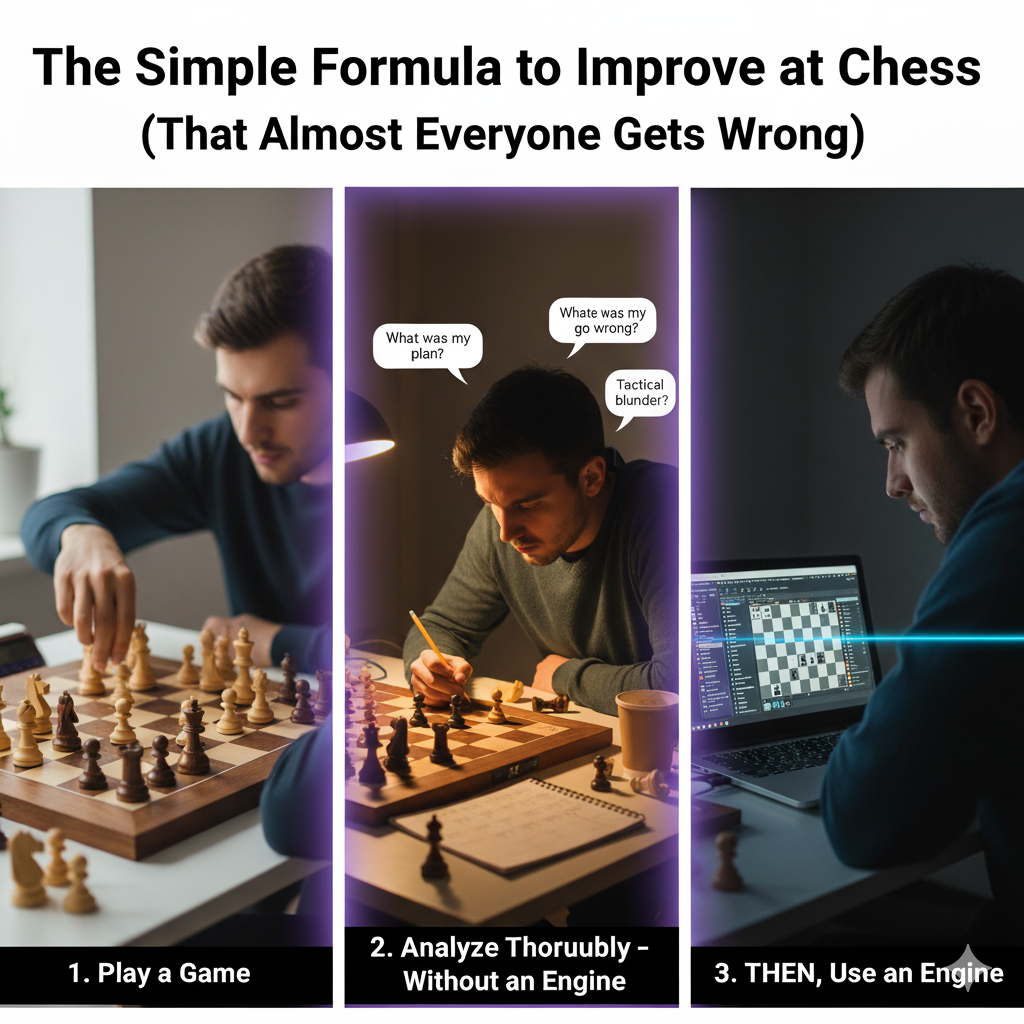
Every day, thousands of players play blitz online, binge YouTube videos, or memorize opening lines, yet their rating barely improves.
It’s not because they lack talent.
It’s because they confuse doing more with getting better.
Some players only study; they watch, read, and note everything, but never apply it. Others play nonstop games without understanding what they’re repeating wrong. Both stay trapped in the same loop.
Real progress happens when you train the right way with purpose, structure, and reflection.
At ChessBrainz, we’ve seen this pattern hundreds of times. Students who follow this approach grow steadily, enjoy learning, and play with confidence. The secret lies in one simple 3-step formula.
Study → Practice → Review → Repeat
That’s the entire process.
It looks simple, but it’s what separates stuck players from improving ones.
Good learning starts with focus.
Instead of random content, focus on one clear goal each week: tactics, planning, or endgames.
If you’re a beginner or intermediate player, master these core areas first:
Tactics: forks, pins, discovered attacks, and mating nets.
Endgames: basic king and pawn endings, opposition, and rook activity.
Openings: understand principles before memorizing moves.
Learning with intention means studying less but absorbing more.
If you can’t explain a concept in your own words, you haven’t learned it yet.
Studying is theory; playing is the test.
After every learning session, apply it in games. Play rapid time controls (10+ or 15+) where you can actually think.
Each game should have a purpose.
If you studied “weak squares,” focus only on spotting and using them.
Playing endlessly without direction only builds habits, not skills.
This is the difference between activity and progress.
After each session, look back at your games and identify patterns.
Where did you miscalculate?
Did you rush under time pressure?
Did you misunderstand a pawn structure?
Use your mistakes as lessons, not failures.
Engines can show what went wrong, but you need to understand why.
At ChessBrainz, our coaches focus exactly on this step reviewing games personally with each student so they know how to correct, not just memorize.
The right mindset is your biggest strength.
You won’t improve by avoiding mistakes; you improve by learning from them faster than others.
Every Grandmaster has lost hundreds of games. What makes them great is their attitude: they stay curious, patient, and disciplined even when results go wrong.
That’s the mindset we train in our students to be confident, curious, and calm under pressure.
Ask yourself after every session, Do I have something to digest?
If yes, go play.
If not, go study.
Learning is like eating; progress happens when you digest what you’ve learned through practice.
This is how our ChessBrainz curriculum is built: structured topics, weekly tournaments to apply them, and review sessions to strengthen understanding.
When I switched from 1.d4 to 1.e4, I struggled badly at first. I lost positions I didn’t understand, and theory overwhelmed me.
Then I followed this same formula:
Study: Learn the main ideas behind each opening, not lines.
Practice: Play real games to see where I fail.
Review: Analyze with feedback, update my notes, and fix mistakes.
In months, my opening confidence and middlegame plans improved drastically.
This same method works for kids, adults, and competitive players if followed consistently.
If you’re serious about improving, start with this simple plan:
Pick one area to improve this week (openings, tactics, or endgames).
Study that area for 30 minutes a day.
Play 5–10 focused games applying what you learned.
Review and fix your mistakes.
Repeat next week with a new topic.
Follow this for 30 days, and you’ll see real, visible progress not just in results, but in understanding.
If you truly want to become a strong, confident, and tournament-ready player, join our ChessBrainz Online Classes.
Our structured program, curated and mentored by GM Srinath Narayanan, follows this same proven 3-step improvement system tailored for every level, from beginner to advanced.
🎯 Book your Free Demo Class today and experience the difference.
👉 Book Free Demo
Learn from FIDE-rated coaches, play weekly tournaments, receive game reports, and get certificates signed by GM Srinath himself.
Start training smarter. Don’t just play chess; master it.
Improvement doesn’t come from luck or motivation it comes from a process:
Study → Practice → Review → Repeat.
Follow this, and you’ll soon see the difference in how you think, not just how you move the pieces.
— Kunal Gupta